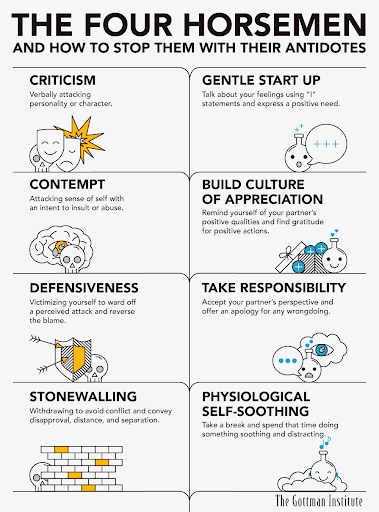The Four Horsemen: What They Mean for Your Relationship (and How to Stop Them)

Even the healthiest relationships encounter conflict. What matters most isn’t if couples fight—it’s how they fight.
Drs. John and Julie Gottman, founders of the Gottman Institute and pioneers in relationship research, discovered that they could predict divorce with over 90% accuracy based on how couples handle conflict. Their work revealed four key behaviors—called the Four Horsemen of the Apocalypse—that are particularly destructive to relationships if left unaddressed.
Let’s explore what these horsemen are, how to spot them, and most importantly, how to replace them with healthier communication patterns.
1. Criticism
What it looks like:
Attacking your partner’s character or personality instead of addressing a specific behavior.
Example: “You never think about anyone but yourself. You’re so selfish.”
Why it’s harmful:
Criticism makes your partner feel blamed, attacked, and often leads to defensiveness (the next horseman). Over time, it erodes safety and trust.
The antidote: Gentle Start-Up
Instead of accusing, express your feelings and needs without blame.
Try: “I feel hurt when I make dinner and no one acknowledges it. Can we talk about how we share appreciation at home?”
2. Defensiveness
What it looks like:
Playing the victim, making excuses, or counterattacking to protect yourself from perceived blame.
Example: “It’s not my fault we’re late—you’re the one who took forever to get ready!”
Why it’s harmful:
Defensiveness blocks accountability and escalates the argument. It’s a way of saying, “The problem isn’t me—it’s you.”
The antidote: Take Responsibility
Even if you don’t feel 100% at fault, own your part.
Try: “You’re right, I could have managed my time better. Let’s figure out how to get out the door more smoothly next time.”
3. Contempt
What it looks like:
Mocking, sarcasm, eye-rolling, name-calling—anything that communicates disrespect or superiority.
Example: “Oh please, like you actually care. You’re so clueless.”
Why it’s harmful:
Contempt is the most dangerous of the four horsemen. It communicates disgust and makes your partner feel worthless. Gottman calls it the single greatest predictor of relationship breakdown.
The antidote: Build a Culture of Appreciation
Regularly express gratitude, admiration, and respect. Make small, positive interactions a habit.
Try: “I really appreciated how you handled the kids tonight—it gave me a chance to breathe.”
4. Stonewalling
What it looks like:
Shutting down, going silent, or withdrawing from interaction—often in response to feeling overwhelmed.
Example: (Silent treatment, turning away, or walking out mid-conversation.)
Why it’s harmful:
Stonewalling cuts off connection and makes it impossible to resolve conflict. It often leaves the other partner feeling abandoned or dismissed.
The antidote: Self-Soothing and Re-engagement
Recognize when you’re emotionally flooded. Take a break to calm down (at least 20 minutes), then return to the conversation.
Try: “I’m feeling overwhelmed and need a few minutes to regroup. I care about this conversation and want to come back to it calmly.”
Breaking the Cycle Together
If these patterns sound familiar, you’re not alone. All couples experience some version of the Four Horsemen at times. What matters is learning to recognize them, slow them down, and practice the antidotes.
At North Bay Counselling, we work with couples to rebuild trust, deepen emotional connection, and learn new ways to communicate. Using research-backed approaches like the Gottman Method and Emotionally Focused Therapy (EFT), we help partners shift from conflict to connection.
You don’t have to navigate this alone.
If you’re seeing these patterns in your relationship and don’t know how to change them, we’re here to help.
Reach out to North Bay Counselling to book a session.
Together, we can turn these horsemen around—and bring compassion back into your relationship.














